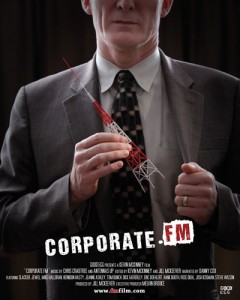At Radio Survivor we obsess about radio consolidation every day of the year, but this topic isn’t pervasive across mainstream popular culture. Because of that, I was excited to hear about a new film, Corporate FM, which delves into the “downfall of commercial FM.” The movie premieres tonight at 8:30pm at the Kansas City Film Fest and will play at the festival again tomorrow (Saturday, April 14 at 3:45pm).
The film chronicles changes to the commercial radio industry following a lift on ownership caps in the late 1990s. It argues that corporate radio consolidation has led to a loss of local owners and local content on radio, which in turn has hurt communities.
To get more insight into the impetus for the film, I spoke with director Kevin McKinney over email. In our conversation he explains why he thinks that commercial radio has let down local communities. He points out that commercial radio has the potential to reach many more listeners than both community and college radio and argues that these non-commercial stations (and LPFM) can’t “fill the void” left by changes to commercial radio. McKinney says, “If an entire city is to be connected, there have to be commercial stations with a staff who can listen to their community and present it back to them.”
Jennifer Waits: What inspired you to make the film?
Kevin McKinney: I got the initial idea to make this film because it seemed ludicrous that a station could fire its listeners and then somehow profit. If all the stations were losing listeners from their declining quality of programming, how could these stations sell for more and more? The inspiration came when I realized that the people on the inside were fighting to be local but losing to the financial overlords that now owned the stations.
Waits: Does college/community radio make an appearance in the film?
McKinney: The film is about the downfall of commercial FM. I believe that community radio, college radio and even NPR do not fill the void that was left when we lost commercial radio as a medium to support the community, because these stations do not have the same audience. If an entire city is to be connected, there have to be commercial stations with a staff who can listen to their community and present it back to them. By cutting back to only one or two people running an entire station, there is no room for audience interaction.
I did interview community and college stations to help me tell this story. I wanted to show what the soul of a community through the medium of radio really looks like. We see some of KJHK in Lawrence, Kansas as well as KKFI, a community radio station in Kansas City, Missouri.
Waits: Do you see a connection between consolidation in commercial radio and consolidation in public radio?
McKinney: Everyone is reading the same trades. And because of that they are all prisoners of conventional wisdom that is INCORRECT. The consultants who tell Clear Channel to abandon the term “radio” in their name also tell NPR to do the same. It’s idiotic for NPR because it shows a lack of confidence in radio as a medium, after 40+ years of branding. It also confuses their listeners into thinking that by supporting public “media” that they are also supporting PBS or that the terrestrial signal does not matter anymore. The worst part of this is that it perpetuates the lie that the internet can replace radio.
Radio is powerful because it is the only infrastructure that reaches everybody in a community free and effortlessly. I’m hoping the new CEO of NPR will understand its power outside of other forms of media and change the name back to National Public Radio. It would be a smart move because the terrestrial signal is the one thing that makes radio unique. The term “media” is vague, and it’s obvious that every business also has a multi-media web page now. That thinking is sooo 2000.
Waits: Why is live, local radio important?
McKinney: ‘Live and local’ is important because without it, radio is no better than the internet or satellite radio. It’s what makes radio relevant. But the most important reason for live and local is that radio is the only medium in which an entire city can hear itself. Imagine if you could not hear yourself think. How would you develop? This process of hearing ourselves think is how we understand larger more complex ideas. Radio can germinate ideas in the collective heart/brain of a city. Commercial DJs are often told to keep their speaking to 15 seconds or less because research (Arbitron) shows that listeners prefer music. They have to squeeze in the station ID in that time too. That point alone is killing local charities. Gone are the personal stories from the DJ’s own experience that would motivate the larger audience beyond the core givers.
Waits: Are you a radio activist?
McKinney: I think when you say “activist” the common image is of a grungy hippy who only cares about LPFM. I love LPFM on its own but I do not think it is an answer or excuse for commercial radio to suck. Any “penny whistle” sized signal is too small to do what commercial FM should be doing. It has potential in high density populations in a large city or for religious compounds in the countryside, but I don’t see it unifying a large enough population to shape and establish a unique style of a city’s music and culture. I’m an advocate for giving our cities the power to create a critical mass behind local movements and new ideas.
Waits: Anything else?
McKinney: We are taking this message on the road to film festivals and independent theaters. We believe that the local movement needs its collective megaphone back. We are doing a Kickstarter to fund distribution expenses and purchase NPR underwriting along the way.



